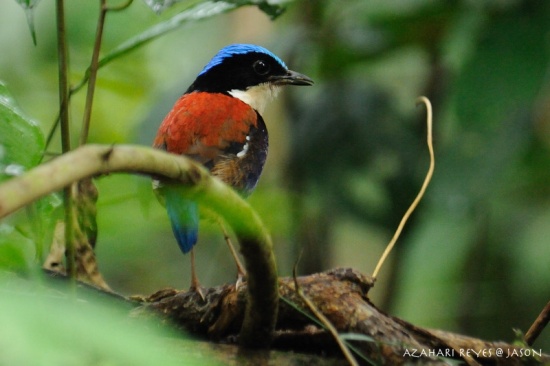(completed, picture replaced) |
(Artwork showing female. References updated) |
||
| Line 13: | Line 13: | ||
*Deep violet-blue underparts<br /> | *Deep violet-blue underparts<br /> | ||
'''Female''' | '''Female''' | ||
| + | [[Image:06 Pitta-baudi.jpg|thumb|350px|right|Female on left<br />Artwork by {{user|turtle-rn|turtle-rn}}]] | ||
*Buff crown and upperparts | *Buff crown and upperparts | ||
*Buffy cheeks to vent | *Buffy cheeks to vent | ||
| Line 31: | Line 32: | ||
Probably a sedentary species. | Probably a sedentary species. | ||
==References== | ==References== | ||
| − | #{{Ref- | + | #{{Ref-Clements6thOct12}}#{{Ref-HM03Cor8}}#{{Ref-GillDonsker10}}#{{Ref-HBWVol8}} |
#BirdLife International | #BirdLife International | ||
{{ref}} | {{ref}} | ||
Revision as of 16:51, 25 December 2012
- Pitta baudii
Hydrornis baudii
Identification
17 cm
Male
- Blue crown
- Black cheeks
- Reddish-brown mantle
- Black wings marked with white
- Blue tail
- White throat
- Deep violet-blue underparts
Female
- Buff crown and upperparts
- Buffy cheeks to vent
Juveniles are similar to females but duller, have a dark brown breast and brown and golden marbled underparts.
Distribution
Endemic to Borneo.
A locally common species but with a patchy distribution. Threatened by rapid deforestation.
Taxonomy
This is a monotypic species[1].
Placed in genus Hydrornis by Gill and Donsker[3], formerly placed in its own genus Iridipitta.
Habitat
Dense cover in moist lowland forests to 600m. Often close to rivers.
Behaviour
A shy and secretive species.
Feeds on earthworms, beetles, ants, grasshoppers, caterpillars and other arthropods.
Feeds among leaf litter by turning over leaves.
The few breeding records suggest a breeding season from March to October. A recorded nest was domed, made of dead leaves and herbs and placed 0.5m above the ground. The clutch consisted of 2 eggs.
Probably a sedentary species.
References
- Clements, J. F., T. S. Schulenberg, M. J. Iliff, B.L. Sullivan, C. L. Wood, and D. Roberson. 2012. The eBird/Clements Checklist of Birds of the World. 6th ed., with updates to October 2012. Ithaca: Cornell Univ. Press. ISBN 978-0801445019. Spreadsheet available at http://www.birds.cornell.edu/clementschecklist/downloadable-clements-checklist
- Dickinson, EC, ed. 2003. The Howard and Moore Complete Checklist of the Birds of the World. 3rd ed., with updates to October 2008 (Corrigenda 8). Princeton: Princeton Univ. Press. ISBN 978-0691117010
- Gill, F and D Donsker (Eds). 2010. IOC World Bird Names (version 2.7). Available at http://www.worldbirdnames.org/.
- Del Hoyo, J, A Elliot, and D Christie, eds. 2003. Handbook of the Birds of the World. Volume 8: Broadbills to Tapaculos. Barcelona: Lynx Edicions. ISBN 978-8487334504
- BirdLife International
Recommended Citation
- BirdForum Opus contributors. (2024) Blue-headed Pitta. In: BirdForum, the forum for wild birds and birding. Retrieved 29 April 2024 from https://www.birdforum.net/opus/Blue-headed_Pitta





